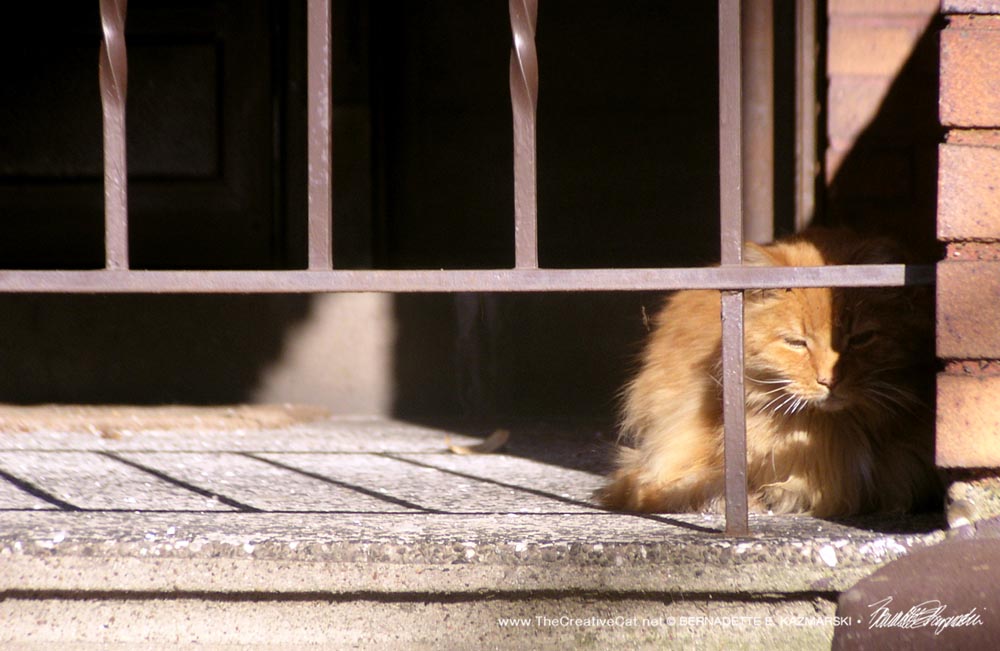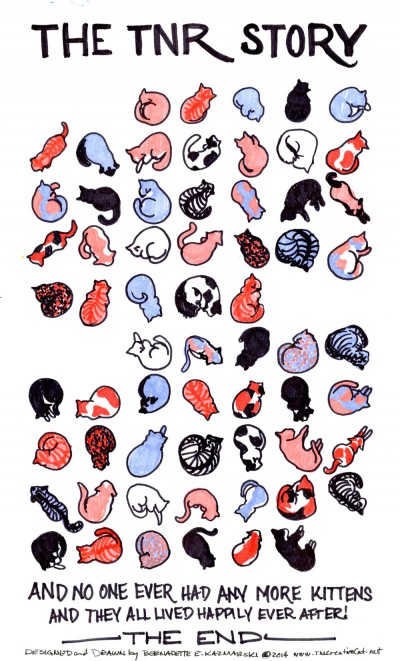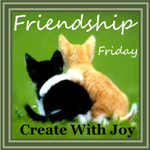May is Animal Guardian Month

Language matters. The words we use to refer to something also describe our relationship with it, how we feel about it, its importance in our life. In my own lifetime I’ve watched the language we use to refer to physically or intellectually disabled people, to women, to the elderly, and individual ethnicities of people evolve from insulting, derogatory language that marginalized to terms that are both more accurate and respectful, and inclusive.
The way I’ve referred to my relationship with my cats has changed over the same years, from “pet owner” to “animal guardian” as my understanding of cats and other animals has grown and I felt the need to change my words. “Pet owner”? “Cat owner”? There’s the joke about no one owning a cat, but I really never felt that way about them, as if they were a possession. And the term “pet”, what does that really mean? Does that distinguish the being from other animals in our lives, like wildlife in the back yard, but where does that leave the chickens in the back yard, who are not wildlife but are definitely animals we give care to and care for at a deeper level than the squirrels and the birds, but don’t really take into our house? The term diminishes what they are by referring only to their relationship to us, but not their own agency. Generally pets are animals, so why not just call them that?
In 2017, In Defense of Animals (IDA) dedicated the month of May to “promoting the life-saving language, actions and values of animal guardianship in regard to our fellow beings”. Their goal was to change the exploitative term “owner” to a more equal and respectful “guardian”, and even eliminate the demeaning term “pet” with the more accurate term “animal” or the accurate species for the animal we are referring to.
The term “ownership” represents a demeaning, exploitative and outdated paradigm, and a mindset that non-human animals are mere objects, property, commodities, and things with no interests or needs of their own, to be bred, bought and sold, exploited, and killed for profit, food, fashion, entertainment, experimentation or discarded when they are no longer wanted or useful.
On the other hand, animal “guardianship” instills greater levels of respect, responsibility, compassion, consideration, justice, nonviolence and love toward the animals with whom we share our homes, our lives, our planet.
By pledging to drop the exploitative language of animal “ownership,” we take a step toward bringing about a more positive relationship between human and nonhuman animals.
And that refers to all animals in your life, not just the ones who* sleep on the bed. That extends to community cats, who have no “owner” but who still have a life and the right to live in our society. The cats who need our help to be rescued from a life of deprivation to a life with loving humans. And those pesky squirrels who raid my feeders along with the birds I love to watch. The wildlife whose habitat we’ve so blithely taken too, and all the “live stock” on farms—did you know that’s where the term “stock”, referring to the things people feverishly trade every day that seems to give value to corporations, originated? All the way back to the year 1400 in London, the only value all those farmed animals have had through the centuries was what they could be sold or traded for, and their very presence indicated the wealth of an individual, when they were taken to the Stock Market, but not their value as a living being.
IDA established eight principles to support this change in terminology that in many ways guides our recent change from sheltering animals as warehousing the unwanted and adopting out the lucky ones to building a structure where the goal is to provide sanctuary for animals in need and find homes for all of them, not just the lucky ones.
As animal guardians, we urge all who share their homes with one or more animal companions:
1. To make a lifetime commitment to them, to cherish and love them, to always treat them as family, with respect, compassion, consideration, kindness and gentleness.
2. To care for their emotional needs and work through any behavior issues that may arise.
3. To promise to only adopt, and to never to buy or sell a fellow being – for they are not objects, property, commodities or things to be bought and sold.
4. To commit to sterilizing your animal companions.
5. To always provide them with nutritious food, fresh water and daily exercise and to avoid the use of toxic cleaners and chemicals in your home.
6. To always refer yourself and others as guardians and family of your animal companions, rather than owners or masters.
7. To treat all our fellow beings with whom we share our homes and planet with respect, consideration, kindness, justice and compassion.
8. To protect our and their environments, to preserve their habitats, to work to end their enslavement, and to end any and all cruel and outdated customs and tradition, in our country and around the world.
I find that most of the people I know who love and live with animals, no matter what language they use, live up to these eight principles and are proud to let others know they treat the animals in their lives with respect and compassion. It’s been an interesting metamorphosis, and many of us may find ourselves at any point along the spectrum of change. True change doesn’t happen quickly, it’s a slow trickle from one step to the next, at a pace enough for us to grow into each step and make it permanent, before we take the next. I know the evolution of my words changed one by one over about 20 years, and I still use the term “pet” now and then, and even “owner”, when I feel I need the clarity of those older words, as when I’ll soon be writing about “responsible pet ownership”. During Animal Guardian Month, dedicated to changing our language to match our true feelings, give it some thought and see where you find yourself.
~~~
*In English grammar, the pronoun “who” is reserved for humans, “not objects”, as the rule books read. But years ago I began using “who” when referring to animals as well. Animals are not objects, they are sentient beings, and any spellcheck or grammar check or editor can try to correct me, but that’s one I won’t even discuss. It’s a small change, and most people may not even notice or understand, but I know its meaning, and it’s important to me to stand my ground on that one.
Can’t adopt? Foster! Can’t foster? Donate or volunteer.
There are so many ways you can help cats who need homes and care. You may not have room to adopt another cat, but can foster a cat or kitten for a few weeks. If not that, you can volunteer at a shelter or with a rescue, or donate. You do this because you love your cat, and by doing so you help all cats. No matter which of these actions you take, you help to save a life, and make life better for all cats.
- Adopt one of the cats I’ve posted here, or from any shelter or rescue near you, or from Petfinder, to open up a space for another cat to be rescued and fostered.
- Offer to foster cats or kittens for a shelter or rescue near you.
- Volunteer at a shelter or rescue.
- Find a group of volunteers who work with homeless cats and help them with their efforts.
- Donate to a shelter or rescue near you.
If you can foster kittens or adults cats to help prepare them for a forever home, please run to your nearest shelter and find a cat who needs you! Anyone can help with this effort at any level, even if all you do is donate to a shelter or rescue so they can help to pay for the food or medications needed for their foster, or the spay/neuter/veterinary care during a clinic.
Need to know more? Read Fostering for Your Shelter and Fostering Saves Lives
Gifts featuring cats you know! Visit Portraits of Animals
Art With Donation from Portraits of Animals!

This award-winning art was inspired by working in post op at the May 25, 2014 Homeless Cat Management Team TNR clinic. I’ll make a $5.00 donation to HCMT for each poster sold to help spay and neuter more cats so there won’t be so many to rescue. Quantity discounts are available if you want a stack for a clinic or event. Read more about this artwork and purchase a print of this sketch.

Copyright
All images and text used on this site are copyrighted to Bernadette E. Kazmarski unless otherwise noted and may not be used without my written permission, although links to your site are more than welcome and are shared. Please ask if you are interested in using and image or story in a print or internet publication. If you are interested in purchasing a print of an image or a product including it, check my animal and nature website Portraits of Animals to see if I have it available already. If you don’t find it there, visit Ordering Custom Artwork for more information on a custom greeting card, print or other item.
Subscribe to my e-newsletter
Subscribe to The Creative Cat Preview E-newsletter.
© 2022 | www.TheCreativeCat.net | Published by Bernadette E. Kazmarski
Weekly schedule of features:
Sunday: Essays, Pet Loss, Poetry, The Artist’s Life
Monday: Adoptable Cats, TNR & Shelters
Tuesday: Rescue Stories
Wednesday: Commissioned Portrait or Featured Artwork
Thursday: New Merchandise
Friday: Book Review, Health and Welfare, Advocacy
Saturday: Your Backyard Wildlife Habitat, Living Green With Pets, Creating With Cats
And sometimes, I just throw my hands in the air and have fun!




Pingback: A More Humane Society ~ The Creative Cat
This is fantastic! I agree 1,000% that ‘guardian’ is the way to go!
Thank you for this post; I’m going to share it!
Thanks so much, Vicky! It’s funny, it started out as something else completely, then when I found the original article from IDA I thought, yes, I agree, language makes change! I’ve written about that before, like what we call different cats, all judged by their relationship to us, when really they are all just cats! Thanks for sharing.